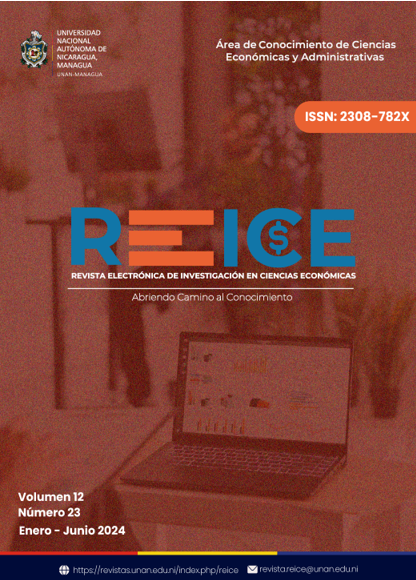Innovación y adaptación en la cultura organizacional: un estudio documental
DOI:
https://doi.org/10.5377/reice.v12i23.18271Palabras clave:
cultura organizacional, innovación, adaptación, tipologías, cambio organizacionalResumen
Un reto que comúnmente enfrentan las organizaciones es cómo sobrevivir y continuar en funciones a través del tiempo. La respuesta a este desafío comúnmente se encuentra en que tengan la capacidad de innovar y adaptarse a su entorno, procesos en los que suele influir, entre otros, una variable organizacional que ha despertado el interés de los investigadores organizacionales desde la década de los ochenta: la cultura organizacional. Este trabajo tiene por fin examinar cómo se ha relacionado dicho fenómeno con los procesos de innovación y adaptación de las organizaciones. Para ello se llevó a cabo un estudio cualitativo hermenéutico, documental y descriptivo. Los resultados reflejan que dentro de los estudios organizacionales existe una importante relación entre ambas variables y que, dentro de las tipologías de cultura que diversos autores han propuesto, se han considerado elementos que fomentan la innovación y adaptación. Se concluye, entre otros, que una empresa que busque implementar cambios profundos deberá examinar si su cultura es la adecuada para ello.
Descargas
Citas
Barney, J. B. (1986). Organizational Culture: Can It Be a Source of Sustained Competitive Advantage? Academy of Management Review, 11(3), 656–665. https://doi.org/https://doi.org/10.5465/amr.1986.4306261
Barney, J. B. (1991). Firm resources and sustained competitive advantage. Journal of Management, 17(1). https://doi.org/https://doi.org/10.1177/014920639101700108
Belias, D., Koustelios, A., Vairaktarakis, G., & Sdrolias, L. (2015). Organizational Culture and Job Satisfaction of Greek Banking Institutions. Procedia - Social and Behavioral Sciences, 175, 314–323. https://doi.org/10.1016/j.sbspro.2015.01.1206
Cameron, K. S., & Quinn, R. E. (1999). Diagnosing and Changing Organizational Culture: Based on the Competing Values Framework. Addison-Wesley.
Cameron, K. S., & Quinn, R. E. (2011). Diagnosing and Changing Organizational Culture: Based on the Competing Values Framework. Wiley.
Deal, T. E., & Kennedy, A. A. (1982). Corporate Cultures: The Rites and Rituals of Corporate Life. Addison-Wesley.
Drucker, P. F. (1955). “Management Science” and the Manager. Management Science, 1(2), 115–126.
Dylan, B. (1964). It´s Alright Ma, I’m Only Bleeding [canción]. In Bringing It All Back Home. https://www.bobdylan.com/songs/its-alright-ma-im-only-bleeding/
Fayol, H. (1917). Administration industrielle et générale: prévoyance, organisation, commandement, coordination, contrôle. Dunod.
Fine, G. (1984). Negotiated Orders and Organizational Cultures. Annual Review of Sociology, 10(1), 239–262. https://doi.org/10.1146/annurev.soc.10.1.239
Harrison, J. R. (1972). Understanding your organization’s character’. Harvard Business Review, 50(23), 119–128. http://www.uulead.org/docs/orgcharacter.pdf
Harrison, J. R. (1995). The Collected Papers of Roger Harrison (1era.). McGraw-Hill.
Hatch, M. J., & Cunliffe, A. L. (2013). Organization Theory: Modern, Symbolic and Postmodern Perspectives (3ra. ed.). Oxford University Press.
Hernández Sampieri, R., Fernández Collado, C., & Baptista Lucio, M. del P. (2014). Metodología de la investigación (6a. ed.). McGraw-Hill.
Iljins, J., Skvarciany, V., & Gaile-Sarkane, E. (2015). Impact of Organizational Culture on Organizational Climate During the Process of Change. Procedia - Social and Behavioral Sciences, 213, 944–950. https://doi.org/10.1016/j.sbspro.2015.11.509
Intxaurburu Clemente, M. G., & Ochoa Laburu, C. (2005). Una revisión teórica de la herramienta de benchmarking. Revista de Dirección y Administración de Empresas, 12, 73–103.
Jones, G. (2013). Teoría organizacional. Diseño y cambio en las organizaciones. Pearson Educación.
Kast, F. E., & Rosenzweig, J. E. (1974). Organization and Management: A Systems Approach. McGraw-Hill.
Katz, D., & Kahn, R. L. (1966). The social psychology of organizations. In The social psychology of organizations. Wiley.
Lewin, K. (1951). Field theory in social science: selected theoretical papers (Edited by Dorwin Cartwright.). In Field theory in social science: selected theoretical papers (Edited by Dorwin Cartwright.). Harpers.
Martínez Ruíz, H. (2012). Metodología de la investigación. CENGAGE Learning.
Mayo, E. (1933). The Human Problems of an Industrial Civilization. Macmillan.
McClelland, D. C. (1961). The achieving society. Van Nostrand.
McGrath, R. G. (2006). Beyond contingency: from structure to structuring in the design of the contemporary organization. In S. R. Clegg, C. Hardy, T. B. Lawrence, & W. R. Nord (Eds.), The SAGE Handbook of Organization Studies. SAGE Publications Ltd. https://doi.org/10.4135/9781848608030.n20
Nonaka, I., & Takeuchi, H. (1995). The knowledge-creating company. Oxford University Press.
Panagiotis, M., Alexandros, S., & George, P. (2014). Organizational Culture and Motivation in the Public Sector. The Case of the City of Zografou. Procedia Economics and Finance, 14, 415–424. https://doi.org/https://doi.org/10.1016/S2212-5671(14)00730-8
Pettigrew, A. M. (1979). On Studying Organizational Cultures. Administrative Science Quarterly, 24(4), 570–581. https://doi.org/https://doi.org/10.2307/2392363
Roethlisberger, F. J., & Dickson, W. J. (1939). Management and the worker. Harvard University Press.
Sandín Esteban, M. P. (2003). Investigación cualitativa en educación: fundamentos y tradiciones. McGraw-Hill.
Schein, E. H. (1984). Coming to a New Awareness of Organizational Culture. Sloan Management Review, 25(2), 3–16. https://www.proquest.com/docview/1302988646
Schneider, W. E. (1994). The reengineering alternative: A plan for making your current culture work. Irwin Professional Pub.
Taylor, F. W. (1911). The Principles of Scientific Management. Harper & Brothers.
Tesluk, P. E., Farr, J. L., & Klein, S. R. (1997). Influences of organizational culture and climate on individual creativity. Journal of Creative Behavior, 31(1), 27–41. https://doi.org/10.1002/j.2162-6057.1997.tb00779.x
Wallach, E. J. (1983). Organizations: The cultural match. Training and Development Journal, 37(2), 29–36.
Descargas
Publicado
Cómo citar
Número
Sección
Licencia
Derechos de autor 2024 REICE: Revista Electrónica de Investigación en Ciencias Económicas

Esta obra está bajo una licencia internacional Creative Commons Atribución-NoComercial-CompartirIgual 4.0.

